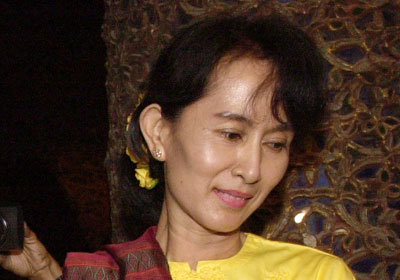No diplomats invited to fourth day of Aung San Suu Kyi trial
 Yangon - Diplomats and journalists were not invited to the fourth day of democracy icon Aung San Suu Kyi's trial Thursday after the junta allowed them to attend proceedings a day earlier, sources said.
Yangon - Diplomats and journalists were not invited to the fourth day of democracy icon Aung San Suu Kyi's trial Thursday after the junta allowed them to attend proceedings a day earlier, sources said.
Suu Kyi herself did not attend the morning session, military sources said. At those proceedings, persecutors presented evidence against American national John William Yettaw, 53, who stands accused of violating various laws for swimming to Suu Kyi's home-cum-prison in Yangon on May 3 and staying there until May 5, they said.
Yettaw, a member of the Church of Jesus Christ of Latter-Day Saints, faces several charges, including immigration violations for visiting a prisoner while on a tourist visa and municipal laws for swimming illegally in Inya Lake, according to state media reports.
Prosecutors claimed Yettaw first visited Suu Kyi's house on November 30 when he handed over his church's Book of Mormon to her servants for Suu Kyi to read.
His uninvited May 3 visit to Suu Kyi's residence has allowed the ruling junta to charge her with violating the terms of her house detention, which has lasted the past six years and was due to expire on May 27.
The new case against Suu Kyi, her two household helpers and Yettaw, which began Monday in Yangon's Insein Prison, has outraged the international community and even prompted warnings from Myanmar's close allies in the Association of South-East Asian Nations (ASEAN).
On Wednesday, the regime surprised observers by allowing 30 foreign diplomats and five journalists from the international media to attend the afternoon session.
After the trial, Suu Kyi. The 1991 Nobel Peace Prize laureate, was even permitted to chat with the diplomats and hold talks with the ambassadors of Russia, Singapore and Thailand.
Russia is a member of the UN Security Council, Thailand is chair of ASEAN this year and Singapore's ambassador is dean of the diplomatic corps in Yangon.
According to Singapore Ambassador Robert Chua, Suu Kyi told them she and her servants had been well-treated in the prison.
"She also expressed the view that it was not too late for something good to come out of this unfortunate incident," Singapore's Foreign Ministry said in a statement Wednesday night.
Political observers said they believe the junta allowed diplomats to attend the case to deflect mounting international criticism of the "show trial" and to derail efforts to get the UN Security Council to raise the Myanmar issue.
"The Burmese government always tries to reduce external pressure as best they can, especially when advised to do so by their allies Russia and China," said Win Min, a professor of Myanmar studies at Chiang Mai University in Thailand.
It is widely believed that the judges would find Suu Kyi guilty and sentence her to another three to five years in detention, long enough to keep her out of the political picture while the junta stages a general election next year.
"But they may realize that if they put her in Insein Prison, there will be an international outcry and even more sympathy for her in the country, so they may just keep her under house arrest," Win Min speculated.
Suu Kyi, 63, is the leader of the National League for Democracy opposition party, which won the 1990 general election by a landslide but has been blocked from power by Myanmar's junta for the past 19 years. Suu Kyi has spent 13 of those years under house arrest.(dpa)